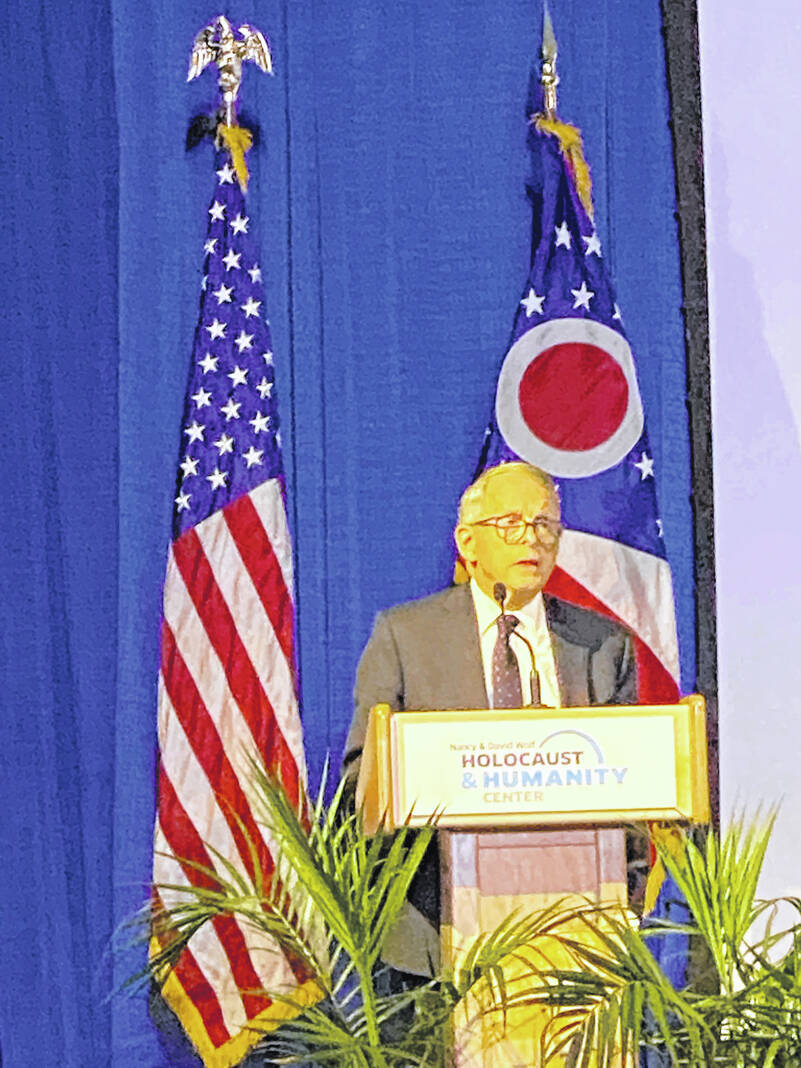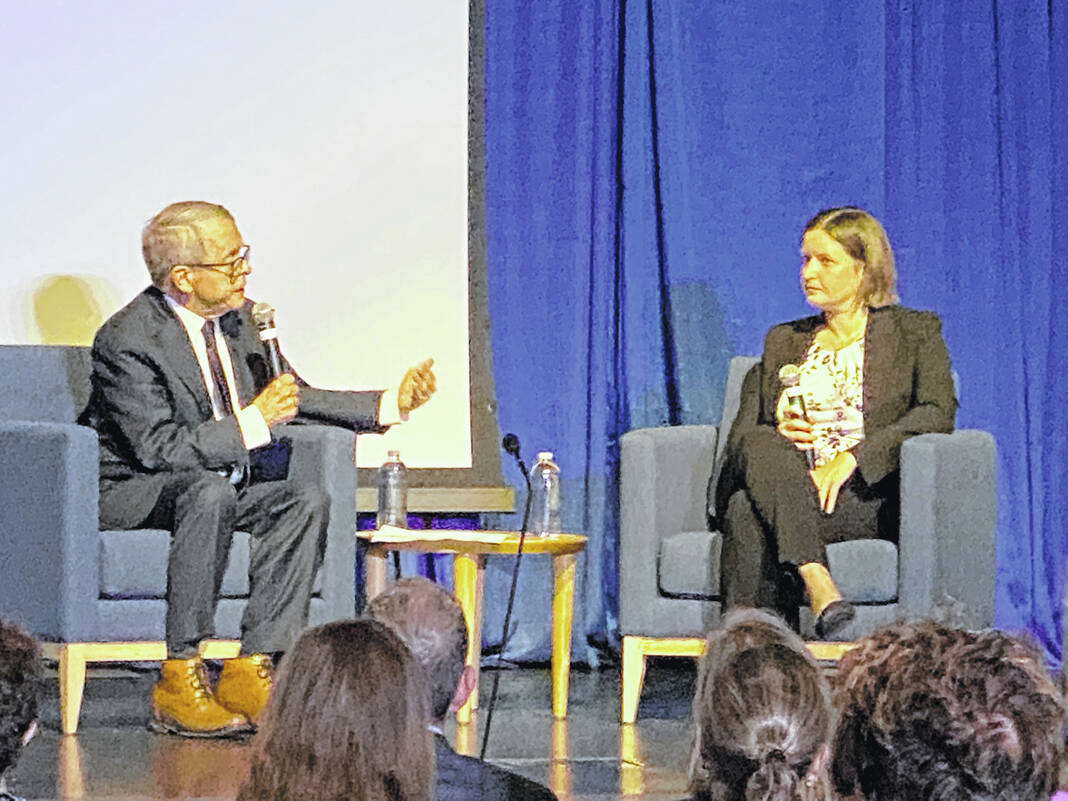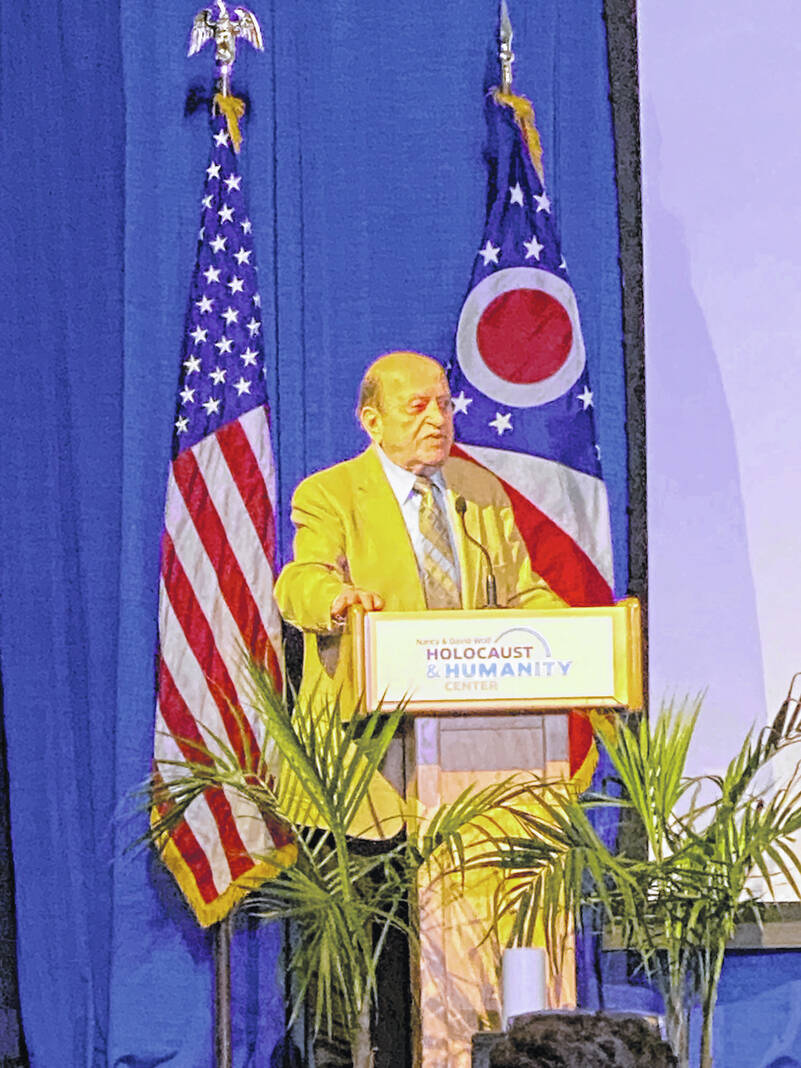


CINCINNATI — Ohio Mayors Association President Mike Barhorst recently represented Ohio’s 938 municipal chief elected officials at the 42nd Annual Governor’s Holocaust Commemoration. Hosted by Ohio Governor Mike DeWine, the event was held at the Nancy & David Wolf Holocaust & Humanity Center located in Cincinnati’s Union Station.
The event began with Rockwern Academy students singing a World War II Jewish Partisan song, “Zog Nit Kein’mol.” As the students marched off the stage, those in attendance were welcomed by David Wise, the board chair for the Holocaust & Humanity Center.
Following his welcome, Governor Mike DeWine took the stage, and in his remarks, noted that the Union Station played a crucial role during the war and in the years that followed. “My dad served in the European Theatre, and went out of here. One-fifth of all the servicemen going off to war went through here. When the war was over, they returned home through here, but so did the survivors of the camps. Once they landed on the coast, survivors coming to Ohio got here primarily by train,” DeWine stated.
DeWine then engaged in a conversation with Dr. Rebecca Erbelding, a historian , archivist and curator at the United States Holocause Memorial Museum in Washington, D.C. Erbelding, author of the award winning book entitled Rescue Board: The Untold Story of America’s Efforts to Save the Jews of Europe, spoke at length about the role individual citizens and government officials must play in a democracy.
“The reason the United States began to actively work to rescue European Jews toward the end of the war was because of public pressure,” Erbelding said. She specifically credited pressure from U.S. Department of Treasury Secretary Henry Morgenthau Jr. with helping to influence President Franklin D. Roosevelt to establish the War Refugee Board.
“I think our lessons are to stand up,” Erbelding said. “I think it’s on us as government employees to be brave when we have to be brave. I think it’s on the American people to demand bravery from their government officials, to write letters, to attend marches and rallies to let their elected officials know about the causes that they care about. It is really important to be participants in our democracy.”
Offering virtual remarks were Counsul General of Isreal Asaf Zamir, Ohio House of Representatives Speaker Bob Cupp, and Ohio Senate President Matt Huffman. All three spoke about the rise of Anti-Semitism, and the important role that education must play in creating responsible citizens.
During the ceremony, Conrad Weidner, who was just 3½ years old when he was imprisoned with his mother and survived Bundi, a forced labor camp in Transnistria, and Army Command Sergeant Major Henry Armstrong, who helped liberate Gunskirchen Lager, a concentration camp in Austria, spoke of their experiences. Once they finished speaking, they then both helped light a memorial candle.
During his remarks, Armstrong said the Holocaust should be a constant reminder to treat people better. “I don’t care what your faith, what your color or anything else,” the 97-year old Armstrong stated, “we are all God’s creatures, and that’s the way we should be treated – treated the way you want to be treated.”
In his remarks, Weiner stated that remembering the horrors of the Holocaust is important because of history repeating itself in The Ukraine. “Ladies and gentlemen,” Weiner stated, “I beg of you, today the world is burning. Do not stand by with folded arms.”
“We are fortunate that we still have people who are alive, who remember and can tell us their story,” DeWine noted. “Every story is different. Every survivor has a story that you can hardly believe. People around them were killed. Their families were killed, but they survived, and they can tell us that story.”
DeWine expressed hope that the future generations can be taught the lessons of the Holocaust to help prevent future atrocities. “It’s a story that our children, our grandchildren and our great-grandchildren need to learn and understand,” DeWine stated.
“When I was a student at Ohio State, I had the opportunity to study the educational system in Europe,” Barhorst stated upon his return to Sidney from Cincinnati. “During my travels, I took time to visit Dachau. From a historical perspective the camp was important. It was the first concentration established in Nazi Germany.”
“In fact, the camp was established just 51 days after Hitler was appointed chancellor. The first prisoners were political prisoners including Catholic priests, Lutheran ministers and college professors, those most likely to speak out against Hitler’s plans,” Barhorst said.
“That visit left a lasting impression on me,” Barhorst continued, “and was one of the reasons that I actually looked forward to representing Ohio’s mayors at this observance. I had so hoped that we’d never again see the kind of warfare that took place in World War II again. Unfortunately those hopes were dashed with what we are witnessing in The Ukraine.”




